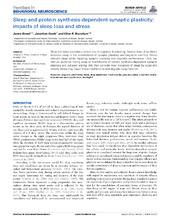| dc.contributor.author | Grønli, Janne | en_US |
| dc.contributor.author | Soule, Jonathan | en_US |
| dc.contributor.author | Bramham, Clive R. | en_US |
| dc.date.accessioned | 2014-12-19T14:32:24Z | |
| dc.date.available | 2014-12-19T14:32:24Z | |
| dc.date.issued | 2014-01-21 | eng |
| dc.identifier.issn | 1662-5153 | |
| dc.identifier.uri | https://hdl.handle.net/1956/8999 | |
| dc.description.abstract | Sleep has been ascribed a critical role in cognitive functioning. Several lines of evidence implicate sleep in the consolidation of synaptic plasticity and long-term memory. Stress disrupts sleep while impairing synaptic plasticity and cognitive performance. Here, we discuss evidence linking sleep to mechanisms of protein synthesis-dependent synaptic plasticity and synaptic scaling. We then consider how disruption of sleep by acute and chronic stress may impair these mechanisms and degrade sleep function. | en_US |
| dc.language.iso | eng | eng |
| dc.publisher | Frontiers | eng |
| dc.rights | Attribution CC BY | eng |
| dc.rights.uri | http://creativecommons.org/licenses/by/3.0/ | eng |
| dc.subject | Long-term potentiation | eng |
| dc.subject | Stress | eng |
| dc.subject | Sleep deprivation | eng |
| dc.subject | mood disorder | eng |
| dc.subject | Gene expression | eng |
| dc.subject | translation control | eng |
| dc.subject | brain-derived neurotrophic factor | eng |
| dc.subject | Arc/Arg3.1 | eng |
| dc.title | Sleep and protein synthesis-dependent synaptic plasticity: impacts of sleep loss and stress | en_US |
| dc.type | Peer reviewed | |
| dc.type | Journal article | |
| dc.description.version | publishedVersion | en_US |
| dc.rights.holder | Copyright 2014 Grønli, Soulé and Bramham. | |
| dc.source.articlenumber | 224 | |
| dc.identifier.doi | https://doi.org/10.3389/fnbeh.2013.00224 | |
| dc.identifier.cristin | 1126664 | |
| dc.source.journal | Frontiers in Behavioral Neuroscience | |
| dc.source.40 | 7 | |

